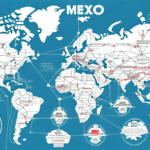Which Carrier Is Best for International Shipping? A Comprehensive Guide
Shipping goods internationally comes with its own set of unique challenges and intricacies. From determining the best carrier to navigating customs regulations and managing return shipments, there are a multitude of factors to consider. The right carrier can make all the difference in ensuring that your goods arrive safely, on time, and at an affordable cost. In this comprehensive guide, we'll explore the various factors to consider when choosing a carrier for international shipping, as well as provide real-life examples and best practices for maximizing your shipping success.
Key Factors to Consider When Choosing an International Shipping Carrier
Reliability and Reputation
When selecting an international shipping carrier, it's essential to assess their reliability and reputation. Look for carriers with a proven track record of safe and timely deliveries. According to the U.S. Department of Transportation, major carriers like DHL, FedEx, and UPS consistently rank high in customer satisfaction for international shipments.
Network and Coverage
Evaluate the carrier's global network and coverage areas. Ensure that the carrier serves the countries you plan to ship to. A comprehensive network reduces transit times and increases the likelihood of on-time deliveries. For instance, DHL operates in over 220 countries and territories, providing extensive global coverage.
Security Measures
The security of your shipments is paramount. Choose carriers that offer robust tracking systems, insurance options, and secure packaging solutions. Implementing these measures helps protect your goods from theft or damage during transit. According to the International Commission of Shipping, enhanced security protocols have significantly reduced loss rates in recent years.
Environmental Impact
With sustainability becoming increasingly important, consider the environmental practices of your chosen carrier. Some carriers are committed to reducing their carbon footprint by using alternative fuels and minimizing packaging waste. For example, UPS has invested in alternative fuel vehicles and aims to achieve 12% carbon neutrality by 2025.
The Importance of Tracking and Delivery Confirmation for International Shipments
Real-Time Tracking
Real-time tracking enables you to monitor your shipments at every stage of transit. This transparency helps in proactively addressing any delays or issues that may arise. According to a study by Supply Chain Digital, businesses that utilize real-time tracking see a 30% improvement in on-time deliveries.
Enhanced Customer Satisfaction
Providing customers with tracking information enhances their experience by keeping them informed about their order status. This reduces the frequency of customer inquiries regarding delivery and builds trust in your service. According to Forbes, businesses that offer detailed tracking information report a 20% increase in customer satisfaction rates.
Process Optimization
Tracking data offers valuable insights into your shipping process. By analyzing this data, you can identify bottlenecks, optimize routes, and improve overall efficiency. Implementing data-driven strategies can lead to cost savings and faster delivery times.
Understanding Carrier Pricing Structures for International Shipments
Pricing Based on Weight, Dimensions, and Destination
International shipping costs are influenced by several factors, including package weight, dimensions, and destination country. Carriers use complex algorithms to calculate rates based on these parameters. For precise pricing, businesses should utilize carrier rate calculators available on carriers' official websites like UPS, FedEx, and DHL.
Mode of Transportation
The mode of transportation—air, sea, or ground—significantly affects shipping costs and transit times. Air freight is generally faster but more expensive, while sea freight is more cost-effective for larger shipments but has longer transit times. For example, UPS offers both air and sea freight services, allowing businesses to choose based on their urgency and budget.
Additional Fees and Surcharges
Be aware of additional fees such as customs clearance fees, fuel surcharges, and handling fees that carriers may apply to international shipments. These extra costs can vary depending on the destination country and the nature of the goods being shipped. It is crucial to factor these fees into your total shipping costs to avoid unexpected expenses.
Maximizing Cost-Saving Opportunities When Shipping Internationally
Consolidating Shipments
Consolidating multiple shipments into a single larger package can help reduce shipping and handling fees. By taking advantage of volume discounts offered by carriers, businesses can achieve significant cost savings.
Alternative Routing Options
Exploring alternative routing options, such as transshipment or multi-modal routes, can enhance efficiency and reduce costs. For instance, using a combination of air and sea freight may offer a balance between speed and cost.
Optimizing Packaging
Optimizing your packaging to minimize size and weight can lead to substantial savings. Efficient packaging not only reduces shipping costs but also lessens the environmental impact. Consider using lightweight materials and eliminating excess packaging.
Utilizing Freight Forwarders
Partnering with freight forwarders or third-party logistics providers can offer better rates, as these entities often have established relationships with carriers and can negotiate discounts on your behalf. Freight forwarders like FedEx Supply Chain provide comprehensive shipping solutions tailored to your business needs.
Understanding Customs Regulations
Being well-versed in customs regulations and fees is essential to avoid delays and additional costs. Properly declaring the contents of your package and providing accurate documentation can streamline the customs clearance process, ensuring timely deliveries.
Comparing Major Carriers' Transit Times for International Shipments
On-time Delivery Rates
Different carriers have varying on-time delivery rates based on their operational efficiency and network strength. For example, UPS reports an on-time delivery rate of approximately 95% for international shipments, while DHL boasts a similar figure due to its extensive global network.
Expedited Shipping Options
Carriers offer expedited shipping options for urgent shipments, often at a premium cost. These options provide faster transit times and higher reliability. For businesses requiring quick deliveries, investing in expedited services can be worthwhile.
Balancing Cost and Speed
Businesses must balance the need for speed with budget constraints. While expedited shipping ensures faster delivery, ground or sea options may be more cost-effective for less time-sensitive shipments. Evaluate your priorities to choose the most suitable combination of cost and speed.
Evaluating the Reliability and Reputation of Carriers
Customer Service
Responsive and effective customer service is crucial when dealing with international shipments. Carriers that offer dedicated customer support can assist in resolving issues promptly, ensuring minimal disruption to your operations.
Experience in International Shipping
Carriers with extensive experience in international shipping are better equipped to handle the complexities of cross-border logistics. Their expertise can help navigate challenges such as varying regulations and cultural differences.
Network of Partners and Agents
A carrier's network of local partners and agents in destination countries plays a vital role in the efficiency of deliveries. A strong local presence ensures better handling of shipments and quicker resolution of any issues that arise.
The Impact of Customs Regulations on Choosing an International Shipping Carrier
Handling Customs Clearance
Customs regulations vary significantly across countries, adding complexity to international shipments. Choose a carrier that offers comprehensive customs brokerage services to facilitate smooth clearance processes. Carriers like FedEx provide in-house customs expertise to navigate these complexities.
Understanding Country-specific Regulations
Each country has its own set of import regulations and restrictions. Familiarize yourself with the specific requirements of your destination countries to ensure compliance. Non-compliance can lead to delays, fines, or even seizure of goods.
Understanding Carrier Insurance Options and Limitations for International Shipments
Types of Insurance Coverage
Carrier-provided insurance options vary and are essential for protecting your shipments against loss or damage. Common types include declared value coverage, which covers the declared worth of the shipment, and additional insurance for high-value items.
Coverage Limitations
It's important to understand the limitations of your carrier's insurance policies. Some carriers may exclude certain types of goods or limit coverage amounts based on destination countries. Always read the terms and conditions carefully to ensure adequate protection for your shipments.
Case Studies: Real-life Examples of Successful International Shipping
Examining real-life case studies can provide valuable insights into effective international shipping strategies. For instance, Company X successfully expanded its global reach by partnering with DHL, leveraging their extensive network and reliable tracking services to ensure timely deliveries across 50 countries. Another example is Startup Y, which reduced shipping costs by 15% by optimizing their packaging and consolidating shipments through UPS, while maintaining high customer satisfaction levels.
Advice for Small Businesses Looking to Expand Their Global Reach Through International Shipping
Identifying Unique Needs
Small businesses should begin by identifying their specific shipping needs, including package sizes, shipment frequencies, and target markets. Understanding these requirements helps in selecting a carrier that aligns with your operational goals.
Evaluating Carrier Discounts and Benefits
Many carriers offer special discounts and benefits tailored for small businesses. These can include volume discounts, simplified pricing structures, and dedicated support services. For example, UPS Small Business Solutions provide various tools and resources to help small businesses optimize their shipping processes.
Emerging Trends in the International Shipping Industry
Growth of E-commerce
The surge in e-commerce has significantly influenced the international shipping landscape. With more businesses selling online globally, carriers are adapting by enhancing their infrastructure to handle increased shipment volumes efficiently.
Technological Advancements
Advancements in technology, such as automation, artificial intelligence, and blockchain, are revolutionizing international shipping. These technologies improve tracking accuracy, streamline customs processes, and enhance overall operational efficiency.
Proper Packaging and Labeling for Safe and Secure International Transit
High-Quality Packaging Materials
Using high-quality packaging materials is essential to protect your goods during transit. Invest in sturdy boxes, cushioning materials, and tamper-evident seals to minimize the risk of damage.
Accurate Labeling and Documentation
Ensure that all packages are labeled accurately with clear addresses and include necessary customs documentation. Proper labeling facilitates smoother handling and reduces the likelihood of delays at customs checkpoints.
Best Practices for Managing Returns and Exchanges with an International Carrier
Clear Return Policies
Establish clear and concise return policies for your international customers. Transparent policies help in managing expectations and streamline the return process.
Streamlined Return Processes
Work with your carrier to set up efficient return processes, including easy-to-use return labels and reliable tracking systems. This ensures that returned goods are handled promptly and reduces administrative overhead.
The Role of Technology in Improving the Efficiency and Convenience of International Shipping
Real-time Tracking Systems
Implementing real-time tracking systems allows for continuous monitoring of shipments, enhancing visibility and control over the shipping process.
Automated Customs Clearance
Automated customs clearance technologies expedite the processing of shipments, reducing delays and ensuring quicker delivery times.
Digital Invoicing
Digital invoicing streamlines billing processes, minimizes errors, and accelerates payment cycles, contributing to overall operational efficiency.
By considering all these factors and taking a strategic approach to choosing your international shipping carrier, you can ensure that your goods arrive safely, on time, and at an affordable cost. Always stay up-to-date with the latest trends and best practices in the industry to guarantee your success in the global marketplace.






















